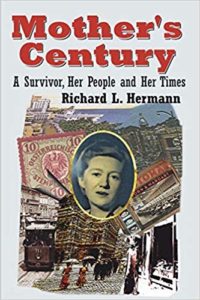By Page H. Gifford
Correspondent
It wasn’t until his mother, Margarete Sobel Hermann, was 100 years of age that her son, Richard Hermann, interviewed her about the history she had witnessed throughout her life.
In his latest book, Mother’s Century, Hermann tells the story from her view of living life in Imperial Austria. She witnessed historic events that changed cultures, people, countries, and relations worldwide for years to come.
Hermann discussed the premise of the book with members of the Lake Monticello Progressive Club. The members understood the parallel between the era his mother lived in and the present and voiced concerns about the rise of Nazism in Europe and anti-Semitism here in America. Hermann spoke to the issue with the knowledge he gained through his mother’s eyes via his interview of her three years before she died.
In her lifetime she was a witness to the assassination of Archduke Franz Ferdinand and the collapse of a 500-year-old empire and the onset of World War I – events that had historic proportions. Expedited by the Germans, Vladimir Ulyanov (Lenin) launched the Bolshevik Revolution and Russia saw the end of the Romanov rule and communism take its place.
During her life, Lindbergh landed in Paris and later Sputnik and Apollo 11 landed on the moon. She saw Kennedy assassinated and Nixon resign. She saw the Civil Rights marches and the advent of women’s rights, which was strange for a woman who became a medical doctor in Austria long before it was accepted in America.
She experienced all kinds of inventions and watched the evolution of the car, the radio, movies, the phonograph, and eventually TV. What she remembered the most, however, was what she most wanted to forget. But like other Jewish people, the memories of the Nazi occupation of Austria and Germany forever haunted her.
This was the moment that shaped Margarete Sobel’s life more than any other in her long existence: the Nazi occupation of her homeland. Growing up she had seen the changes that took place in the aftermath of World War I and the Bolshevik Revolution that altered Russia’s outlook, resulting in the communist regime which would set the tone for foreign policy for years to come.
“She lived 95 percent of her life in the 20thcentury,” said Hermann. By the time of the Nazi occupation in Austria, Sobel was in her early 30s and had already survived famine and rapidly rising inflation, as well as discrimination as a Jew and as a woman struggling to become a doctor in medical school. When the Nazis took power, Sobel realized she and her family needed to get out of Austria.
“It was very difficult to leave. Many of the Jews were rounded up and sent to Auschwitz and eventually to the gas chambers where they died,” Hermann said. In 1938 his mother had a close encounter with the notorious Adolf Eichmann when he was director of the Central Office for Jewish Emigration.
“She was arrested by the Gestapo for illegally practicing medicine and was in violation of the Nazi decree prohibiting Jewish doctors from practicing medicine on non-Jews. One of her Gentile patients turned her in after she performed an abortion. She endured 72 hours of interrogation and never wanted to talk about it,” he said.
She made it out of Austria and survived one of the most tumultuous and violent eras in history.
“Once in America, she met my father, who was also a doctor, and eventually had her only child, which was me,” Hermann said. Sobel settled into her life in America and continued to practice medicine. She watched her son graduate from Yale, Cornell Law School and JAG School.
Hermann has written extensively on the law, including several books. Mother’s Centuryis available on Amazon.





